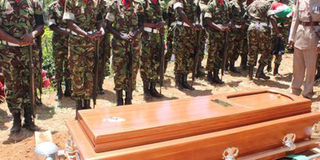El-Adde attack: This is how not to honour our fallen soldiers

Kenya Defence Forces soldiers bury their colleague in Chomo village, Murang'a County, on February 24, 2016. Details on the attack, names of the dead, names of survivors, weapons seized and why the KDF lost the battle, also remain a top-guarded secret. PHOTO | MARTIN MWAURA | NATION MEDIA GROUP
What you need to know:
- President Uhuru Kenyatta, for instance, never declared a national day of mourning and the flag the soldiers’ caskets were wrapped in never flew half-mast.
- It is disturbing that to date, only the Commander-in-Chief and his generals know the number of Kenyans killed and kidnapped in the dawn bloodbath.
In May 2014, I was privileged to attend a US Memorial Day commemoration at Arlington National Cemetery, a 624-acre military graveyard in Virginia.
The highlight of the event was President Barack Obama’s act of compassion to the parents and children of soldiers who were killed in Iraq, Afghanistan, Vietnam, Cambodia, and Korea, among other frontlines.
Mr Obama singled out a woman who had waited for 63 years for her husband’s remains to be located in Korea, and children, who for decades, kept alive phantom dreams of their parents’ return from war.
“Your parents’ bravery lives in you,” Mr Obama said. “You’ll never walk alone.”
But what stood out for me was what I discovered through interviews with 15 relatives of departed troops for my story for The Washington Post — while they all regretted their losses, their hearts were at peace because of the honour the government had accorded their kin.
“His case is well-documented in books of history and it is freely available on the Internet,” Mrs Elsheba Khan, 53, who lost her only son, Corporal Kareem Rashad, in Iraq in 2007, said.
Back home, hundreds of Kenyan families are this month marking a year after their kin paid the ultimate price in the fight against Al-Shabaab at El-Adde in Somalia.
Of great concern is the way the government, Kenya Defence Forces and the African Union Mission in Somalia (Amisom) have treated patriots who sacrificed their lives for the country.
Apart from paying the widows of the fallen soldiers millions of shillings, the bulk of which came from UN coffers, the government has done little or nothing to show respect to the dead.
President Uhuru Kenyatta, for instance, never declared a national day of mourning and the flag the soldiers’ caskets were wrapped in never flew half-mast.
DISAPPOINTING
On January 15, there was nothing significant to remember the soldiers and morally support the young families they left behind.
Military chiefs who graced the low-key memorial at Moi Barracks in Soy, Uasin Gishu, did not provide any answers to families who lost their loved ones, especially relatives of the 13 prisoners of war.
Instead, they warned them against speaking to the media.
It is disturbing that to date, only the Commander-in-Chief and his generals know the number of Kenyans killed and kidnapped in the dawn bloodbath.
Details on the attack, names of the dead, names of survivors, weapons seized and why the KDF lost the battle, also remain a top-guarded secret, even after a KDF Board of Inquiry, National Assembly Committee on Defence, and Amisom investigated the bloodletting.
It is shocking that the UN has bought into our government’s penchant for secrecy yet it has always named and recognised Kenyans who die in its peacekeeping missions.
Yes, it is shameful for a regional military powerhouse like Kenya to lose 176 fighters in one fall to a rag-tag militia, but which country has never lost soldiers in war?
It is laughable that the President has been struggling to show the world Kenya’s sacrifices in the fight against global terrorism but has failed have the soldiers properly honoured.
HONOUR THEM
As the Commander-in-Chief, would he have wished to be treated this way?
The government should know that by refusing to publicly name and recognise our soldiers, it is betraying them, just like the Somalia National Army did on the fateful night of January 15.
This betrayal will, in turn, kill the morale of our soldiers and other Kenyans wishing to join the military.
The least the government can do is to make public the truth on the El-Adde attack, name all dead and kidnapped soldiers, erect a monument for the departed and set aside a national day for remembering all our fallen troops.
What Mr Kenyatta and General Samson Mwathethe may be forgetting is that when a country goes to war, all its citizens become “soldiers” by extension, and that we are all entitled to the truth they are sitting on.
Mr Misiko, a 2017 City University of London MA graduate, is the Online Editor, www.nation.co.ke. Twitter: @misikotwits. Email: [email protected]





